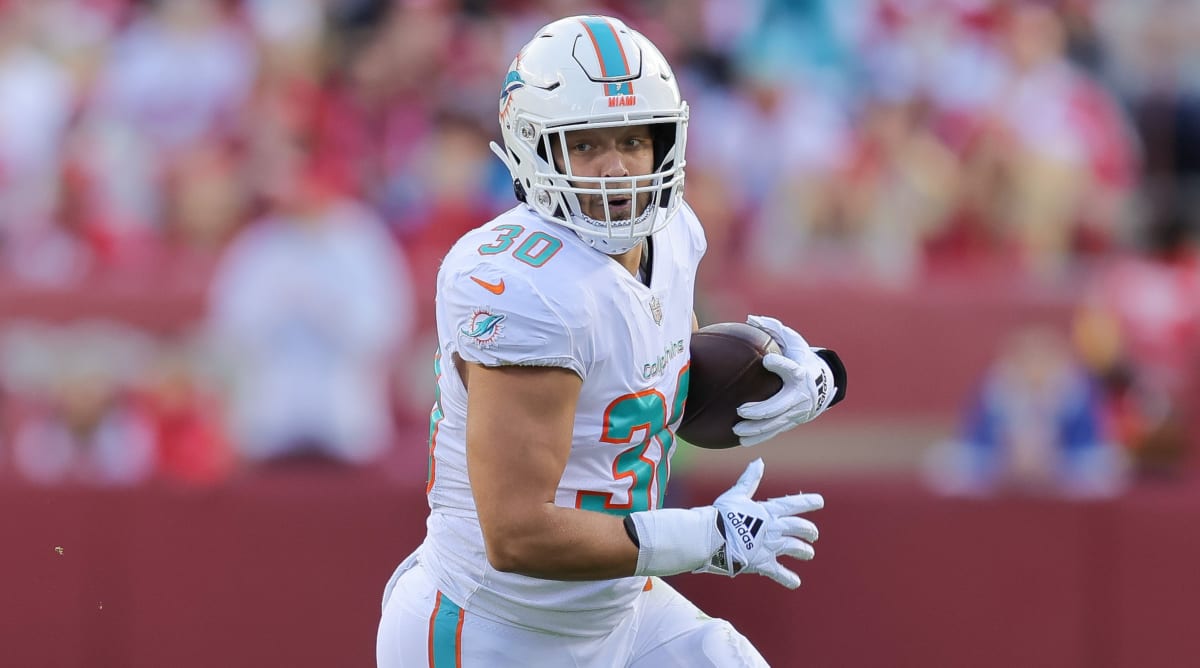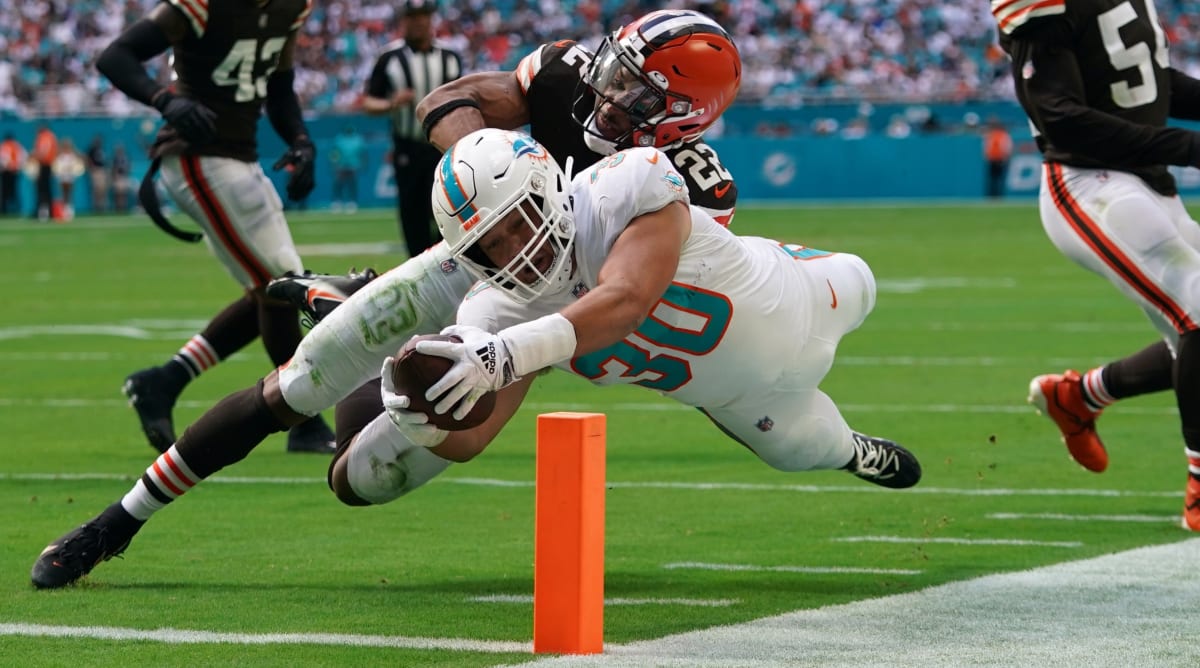Don’t sleep on the Renaissance fullback. That might be the best genre of stereotype-obliterating archetypes in the NFL these days, and while there are numerous examples, there’s no better proof of concept than Alec Ingold. The Dolphins’ one-man block party doesn’t block so much as he flattens. He’s so beloved by coach Mike McDaniel and Miami’s offensive assistants that he signed an extension this summer that made him one of the highest-paid players at his position (three years, up to $17.2 million).
He’s a pillar in McDaniel’s south Florida revival, a protector of quarterback Tua Tagovailoa at a time when protection matters more than ever and a success story in various forms. Undrafted rookie morphs into pillar for multiple franchises (the Raiders and Dolphins, in only four-plus seasons). Stalwart at an allegedly dying position tears ACL, relocates, comes back, plays 40% of new team’s offensive snaps, thrives. Adoptee becomes national spokesman for AdoptUSKids, establishes the Ingold Family Foundation to inspire/support/motivate, especially youth and especially youth in foster care. Fullback-turned-author pens book, inspirational in tenor, a “practical guide to conquering life’s obstacles,” despite not having written the football ending he most desires.
He’s 27, by the way, and focusing on putting all elements of his life together. That ending—a Super Bowl triumph—is up next, followed by, in retirement, a pivot into full-time motivational speaking, with an emphasis on collaboration and reliability, two important traits for any Renaissance fullback.

Sergio Estrada/USA TODAY Sports
SPORTS ILLUSTRATED: You had 14 starts last year, in an offense that’s known for innovation and throwing a ton. Why does [Dolphins coach] Mike McDaniel value you so highly?
Alec Ingold: I mean, you know fullbacks. He’s very easy to buy into, his culture and what he’s trying to sell. I’m buying it. So coming in here, having a vision and just being yourself and not being embarrassed to do that goes a long way around here. That’s everything I try to embody, to the best of my ability.
SI: When I watch you guys play—and small sample size, obviously—there’s a spirit that comes across. I don’t know. Maybe it’s joy. Does that start with the vision and the authenticity you’re describing?
AI: I would say so. Because we’re talking about, as a human being, why things click so well. And it’s beyond the X’s and O’s, right. So if you’re able to take a job assignment and what I’m supposed to do on some inside zone. But then you have a coach who is speaking to your spirit and your soul, and how you go about what you do, and your why, and your purpose, and, actually, like you as a human being. And then you can exemplify that on the field by your play and your actions. That’s where film comes to life. That’s where X’s-and-O’s football comes to life. I don’t know if you can tell. I get jacked up just talking about it.
SI: No, I love it. Cosmic and deep, right off the bat. Let’s stay here for a minute. I’d argue that Mike is as good with schematic design as anyone in the NFL. But as I hear you talk I wonder whether, within that, he can create the spirit you’ve described—his team plays looser, more creatively, more unburdened? Am I trying too hard there?
AI: That’s what I bought into early on. It was cool.
SI: Related: What are his strengths as a coach? I think it’s also safe to say that, due to his youthful experience and actual age (40), McDaniel was a bit of an unusual hire for Miami, too.
AI: Similar to the path we’ve been on—playing to your strengths, seeing the potential in people, bringing that to life, coaching that to life, holding himself to a high accountability standard. And he’s not going to shy away from having to coach people hard or put in the extra time or take accountability for anything. And that supreme ownership filters down into the players. So if I’m watching tape, or we watch game film, a coach can be honest about it. And [McDaniel] shows that vulnerability in front of the whole team that allows me to watch film and be like, Man, I need to do this better. There’s no excuses, right? Like, there’s a bunch of mirrors around here. We’re all pointing thumbs [back at themselves]. And I think that kind of just trickles down from his energy and how he goes about things and his stoic philosophy of never being too high or too low, being present, being mindful and being in the moment.
Watch the Dolphins with Fubo. Start your free trial today.
SI: Beautiful sentiment. Speaking of this, but in relation to Tua . . . I wrote a cover story on him back in his Alabama days, and when I watch him now, I see that influence in his public demeanor. He seems more comfortable, like he has grown into himself. I imagine that’s partly just from getting older. But I wonder, is that also a cultural influence? Part of the same boat?
AI: That’s pretty spot on there. One of the first things we said [about that culture] is, like, I’m able to be myself because of the coach. And when you say someone’s growing into themselves, they’re just truly figuring out that people enjoy when they’re vulnerable, authentic and genuinely themselves. You don’t have to apologize to anybody for that. So when he gets excited after a big play, that’s him being himself. And we love that, we feed off that, that’s the leader in him. And when you get a group of guys who get excited about that, that’s when you smile on the football field because you enjoy playing for one another. And you’re not playing for somebody pretending to be someone they’re not. And that’s the coolest part about what he’s doing.
SI: To have a quarterback and coach aligned like that, beyond the technical aspects of playing football, what does that project for the franchise overall?
AI: If you can embrace it, right, like lean into those strengths and be aware of those weaknesses and not be afraid of it? A lot. We always talk about, you know, in football, like emphasizing your strengths, eliminating your weaknesses, and you take that concept into who you are as a person. And you’re not afraid of failure if you’re not afraid of falling short, because you know guys have your back and they’re willing to accept you for who you are.
SI: I imagine that applies to you and all your outside-football aims, too, no?
AI: Just being extremely honest, I was scared to put that stuff out on social media, because I’m afraid of all these intrusive thoughts, or what other people might think, and oh, he’s not focused on ball or whatnot. No, that helps me be myself on the field. It all carries over. You don’t have to change up personalities, because, even when I’m speaking to kids, I remember being “that kid.” I can just be real. You ever get in front of a group of middle schoolers? They have the best BS readers in the world, man.
SI: I’ve got kids.
AI: That helps me there—out there. And it helps me when I’m in the locker room, too. So, yeah, I really lean into that. And that’s something that has kind of evolved since I’ve been here. Just finding my voice that way.

Jasen Vinlove/USA TODAY Sports
SI: I hesitate to ask this unevolved question. But am I wrong to think that I hear everything you’re laying out and don’t think “fullback” right away?
AI: What do you mean by “fullback”? Like a fullback is a mouth-breathing, weight-lifting, steak-eating crazy guy?
SI: Well . .
AI: No, that’s how I like to get my mindset for the certain plays that require it. It brings my wrestling base back out, my competitive nature, and—don’t get me wrong, I love iso blocks and “best man wins” and putting it all out there. But at the same time, I love the chess match and letting one running play feed into a different pass play and conceptually taking advantage of defenses. It has been an aligned process of growing into the role on the offense and combining both those sides.
SI: You were a state champion wrestler in high school, no? How does that apply to blocking?
AI: It allows for you to be comfortable face to face, in very close quarters, using your body for leverage and understanding your body in relation to space. Any football player aspiring to be a better athlete should wrestle. There’s nothing like a wrestling room. It’s the epitome of a hard-nosed crucible; you go through the wringer. You push yourself to the absolute breaking point, physically and mentally. And those experiences pay off huge in football.
SI: Last one. How have other fullbacks reacted to your contract, which, to me, is indicative of your stature, both on the field and in that locker room? Jealous? Happy for you? Both?
AI: It’s a tight-knit group, man. We all like to see each other succeed. I can’t wait to see the younger guys crush my contract. And Juice [49ers FB Kyle Juszczyk] shot me a message [after signing]; I had all the top-name guys reaching out. It’s a cool little fraternity of guys who support each other. Hopefully I’m the old guy sticking around to pass it down.







